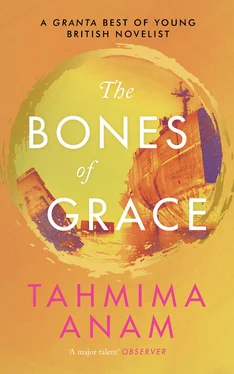These are the kinds of wives that pre-dated me, Elijah. Invisible, magic-wielding, food-stretching, loyal to the last breath. This is the world you crashed into, not a world with people who behaved exactly as they should — of course they didn’t — but who always exceeded what was expected of them, no matter how small their mandates.
We turned onto the highway and I kept glancing over at you to see if I could discern your mood, whether you were angry, or disappointed, wondering if maybe some part of you had thought I hadn’t gotten married after all, but I knew now that you hadn’t moved on as I’d imagined, that I had betrayed you, and despite all that, here you were, your voice marked by the wound I had inflicted.
I had booked you into a small guest-house near the beach, and I suggested we go directly there in case you wanted to freshen up, but you said you wanted to see the beach first. In the car, I was getting ready to point out the scrapyards on the highway, but by the time we had wound our way out of the city, you had fallen asleep, your head tucked against the bend of your arm, your mouth slightly open.
When we arrived an hour later, I gave you a small nudge. ‘You missed the build-up,’ I said. The car passed through the Prosperity gates, and Grace appeared in her eerily pristine form, all three thousand feet of her, white and regal.
I was nervous as you stepped out of the car, as if I had to prove it was worth your coming all this way. You shielded your eyes against the glare of the sun, taking in the ships in the adjacent lots, some already in their last weeks of cutting, and the workers, scattered and small.
‘This is it,’ I said. Together, we looked at Grace . A few men were on deck, lowering what appeared to be a bathtub to the crew waiting below. The bathtub, fastened with rope, knocked against Grace ’s hull as it came down. We watched it hit the sand. The men pulled the ropes away, and then two of them turned it upside down like a canoe and marched it up the beach. They passed us, and I recognised Russel, and called out to him, but he didn’t hear me. In the distance, another large object crested Grace ’s deck.
You put your hands behind your head and gazed up at the sky. ‘I don’t know what to say. This place needs a new language.’
‘Deconstruction won’t do?’ I joked. But I was relieved, because you could see it too, the scale of what was happening.
‘No,’ you said. ‘Even Derrida would struggle.’
The tide started coming in and before long the water lapped at our sandals. We agreed we should return later, but you didn’t move for a long time, your eyes going from Grace to me and back again. Then, after a few minutes, we turned together and headed up the beach. ‘My mother said to tell you hello,’ you said.
‘How is your family?’
‘They’re fine. We haven’t seen a lot of each other lately. That’s the thing about big families, no one ever assumes you need company.’
‘When you’re an only child everyone figures you’re lonely, but they can’t do anything about it. No one can be your sister or your brother.’
You told me you had never thought about it that way. You said your brothers were close, that you saw them often, but that you were the only one who had ever wanted to leave the country.
This surprised me. ‘You don’t all share the same restless spirit?’ I asked.
‘They travel,’ you said. ‘But they don’t wish they were somewhere else.’
I had always, I told you, had my adoption to blame on my sense of not belonging. Every time I wanted to do something weird, or if I liked something that my parents didn’t — chocolate, for example, Ammoo hated chocolate — I told myself, my mother would have liked chocolate. Not that she probably ever tasted chocolate.
You told me that biology wasn’t everything, but that it must be hard, not knowing. And I told you I’d never really thought about it till I met you.
It was lunchtime and I invited you to the apartment for something to eat. It was the first time we were alone, and you were careful not to touch me and I was careful not to touch you. I made elaborate moves so that we weren’t in too close proximity to each other. At the dining table I made sure we were across and not beside each other, in case our hands accidentally reached for the same thing and the back of my palm, or a finger, overlapped with the back of your palm or your finger. And yet I thought all the time about what it would be like to hold your hand, to feel the bristles of your cheek against my face. The terror I had felt upon first seeing you at the airport had softened somewhat, but I could still feel it churning away inside me. The more I wanted you the further away I stayed. It wasn’t like before, in Cambridge — I was married now, and there were other people to consider — but I wasn’t guilty. I can’t really explain why, but nothing about it felt wrong, or like I was doing violence to someone else, or that I was breaking a promise I had made. And, anyway, I hadn’t done anything, not yet.
We talked endlessly about the strangeness of the place, its ugliness and beauty, how the effluent had turned the sand dark grey, and I told you about the sound of chanting, like a keening, as the men carried the heavy sheets of steel on their shoulders, and the insults they would hurl at each other in order to make it from the carcass of a ship to the rolling machine without giving up and letting the metal crash to the ground.
As the sun set and the light in the apartment turned yellow, then orange, it became easier to be in your presence, and I felt myself relaxing, laughing with you as you narrated a story about your recent attempt to learn the ukulele. Mo arrived to make our dinner, and the two of you played a card game that went late into the night. I had feared Gabriela might resent your presence, but she took to you immediately, and it was as if you had always been there, as if you had nowhere else to be but with me in that shabby apartment by the sea. After Gabriela and Mo had gone to bed, you pulled the blue blouse out of your bag. ‘I meant to give this to you earlier,’ you said. There was a silk flower on the neckline, and a panel of lighter coloured fabric along the hem. I thanked you, believing it was the most intimate thing anyone had ever given me. I recalled the suitcase full of saris that had arrived from Rashid’s house on the morning of our wedding, the matching shoes and handbags, the six sets of jewellery, each in its own velvet case. It was disloyal of me to compare that experience with this one, but I couldn’t help myself, trying and failing to stop from imagining what it would have been like with you, wedding and gifts and moving in together and sharing a home, copies of Anna Karenina united on a bookshelf.
‘Oh, and the maple syrup,’ you said. ‘Tomorrow I’ll make pancakes.’
It was almost already tomorrow. I could smell the heat of the day approaching. You leaned back on the floor cushions and tucked your feet under you. It was too late now for the guest-house so I suggested you get a few hours’ sleep. I fetched a blanket and draped it over your legs. Your eyes were heavy and you murmured something about how glad you were that you had come, and before I pulled myself towards you, never again to be free, I retreated to my bedroom and tried to sleep.
We spent the next few days waiting for Ali to give us permission to go aboard Grace . The days seemed longer and shorter with you in them; I felt myself doing everything in a hurry and also with a sense of ease, eating meals with you and listening to music on my tiny wireless speaker and watching you make line drawings of Grace . We took long walks along the shore, your skin darkening quickly as we made our way past the half-broken ships in the adjacent lots. Mo followed you around everywhere with an expression of glee on his face, as if he had been reunited with a long-lost friend.
Читать дальше












